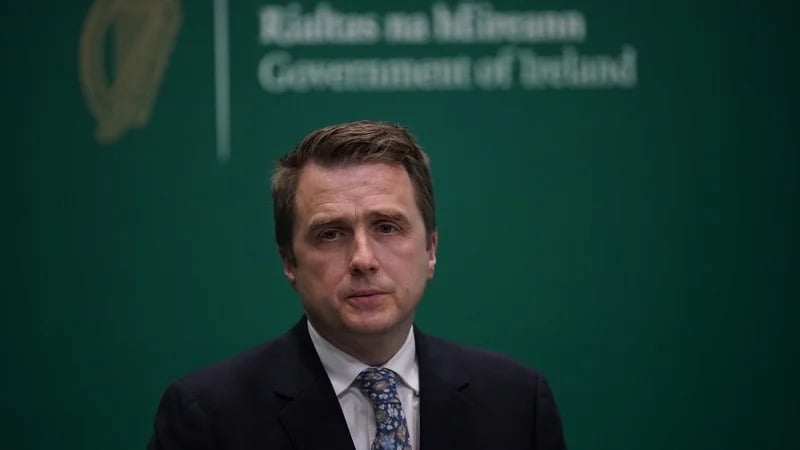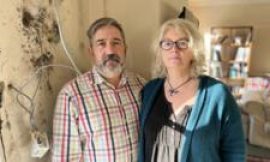Minister for Housing James Browne faces a monumental task, after a dreadful year for housing in 2024 when the Government missed its target for residential construction.
But the Fianna Fáil TD’s first significant move has resulted in a damaging political accident for the coalition, and exposed potential shortcomings in the Government’s plan to make progress on housing.
James Browne came up with a politically ham-fisted plan: to appoint Brendan McDonagh, chief executive of the National Assets Management Agency, to lead the new Housing Activation Office – retaining his current €430,000 salary.
On Thursday afternoon Tánaiste Simon Harris made clear his displeasure about the issue in the Dáil – and by that evening Mr McDonagh had withdrawn his name.
Undoubtedly, Mr McDonagh has shown himself to be a highly capable public servant.
He adroitly steered NAMA, the State body which dealt with the deluge of bad loans which were smothering the banks during the financial crisis.
When that agency was being established, many politicians and observers were sceptical about whether it would succeed. Nothing on its scale had been attempted before.
It did achieve its aims, despite some difficult years when it grappled with truculent developers, collapsing banks and demands to sell assets while the property market was in freefall.
Brendan McDonagh has a reputation for getting things done.

There was undeniable merit in considering him for the role of leading the Government’s Housing Activation Office.
But the fact that Mr McDonagh was to retain his existing salary from NAMA would have had unsettling implications for hierarchy in the civil service.
The highest-paid paid person in any organisation tends to be the boss.
But Mr McDonagh’s salary would have put him far in excess of the secretary-general of the Department of Housing, Graham Doyle, who receives €255,000.
Mr McDonagh has been entitled to a 60% bonus on top of his €430,000 salary, which he has waived every year since the agency was established in 2009. He has foregone a total of €3.9m.
But appointing him to a role within a Government department would have created upward pressure on the salaries of senior civil servants – a situation some Ministers wish to avoid.
Fine Gael has stated the pay for Mr McDonagh would have been excessive.
The second issue the party has highlighted is the lack of an open process to appoint him.
For its part, Fianna Fáil argues that Mr McDonagh’s secondment was flagged with Fine Gael in advance.
Taoiseach Micheál Martin said it was raised by James Browne last month with Minister for Finance Paschal Donohoe, who is responsible for NAMA.
But aside from the blame game, there are also significant questions about the Housing Activation Office and how it is designed.
The idea was originally suggested in the Housing Commission’s report for Government published last year, which recommended “a decision-making body responsible for coordinating the delivery” backed by legislation.
It said this “delivery oversight executive” should drive investment in public utilities such water and electricity on land zoned for housing.
The idea was also included in the Programme for Government agreed with Fianna Fáil, Fine Gael and Independents, and was featured in the election manifestos of some opposition parties such as Sinn Féin.
The idea behind the Housing Activation Office is that it would bring together local authorities, Irish Water and ESB to ensure sites are serviced, which would speed up construction.
There is a concern across the property industry that many locations suitable for building homes are not proceeding because they are not serviced by electricity and water.
But the office being established by Minister Browne will not have executive powers backed by new laws.
Instead, it will function as a committee within the Department of Housing which will liaise with utilities, local authorities and transport bodies.
Sinn Féin’s housing spokesman Eoin Ó Broin said it “lacks the emergency powers” proposed by the Housing Commission and causes “more bureaucracy”.
Labour Party leader Ivana Bacik criticised the Government’s proposal to bring in a high-profile figure to run the Housing Activation Office, saying it was doing the job of the Minister and Department of Housing.
The Government is still committed to the office, which is expected to have a staff of eight to 11 people with some seconded from ESB and Irish Water.
Coalition bickering aside, a sense of urgency is needed to ensure building on suitable sites speeds up – construction was far below expectations last year, partly because of lack of connections to utilities.
James Browne has pointed out that planning permission is expiring on some sites due to these logjams.
Irish Water has said it can only supply services to 35,000 homes a year at a time, whereas the Government is aiming to build 41,000 this year.
Observers calculate that 60,000 to 70,000 homes are needed annually. In other words, more funding for Irish Water is an issue.
This suggests that the row over the appointment of Brendan McDonagh may be short-lived, unlike the housing crisis.




